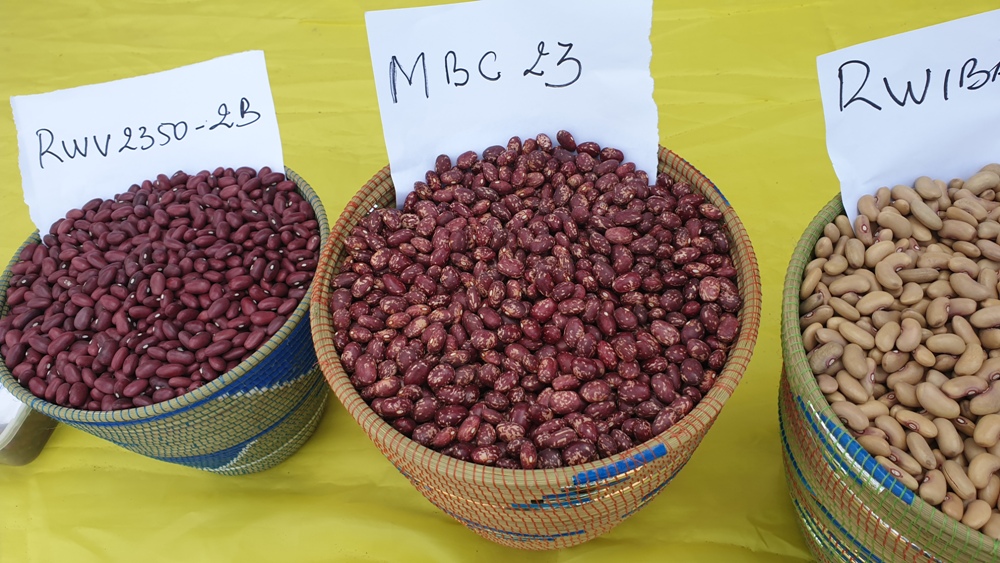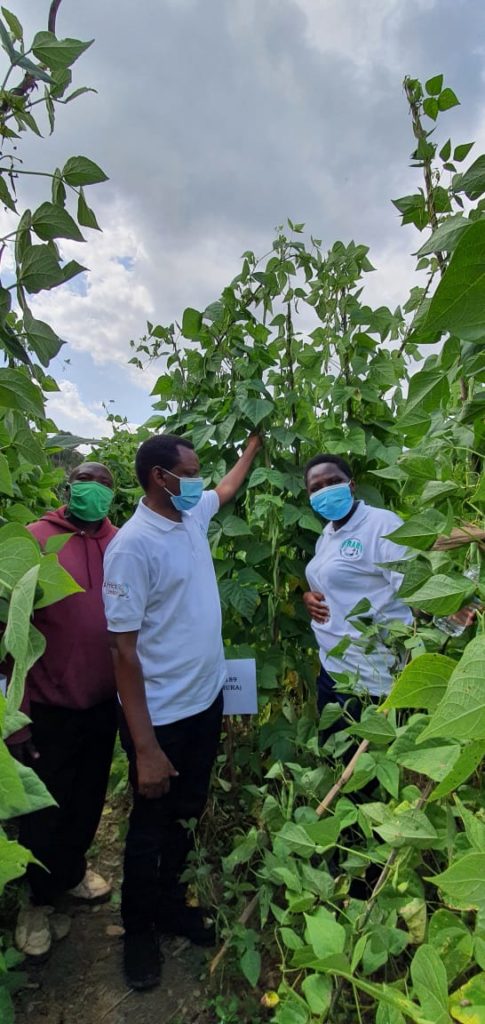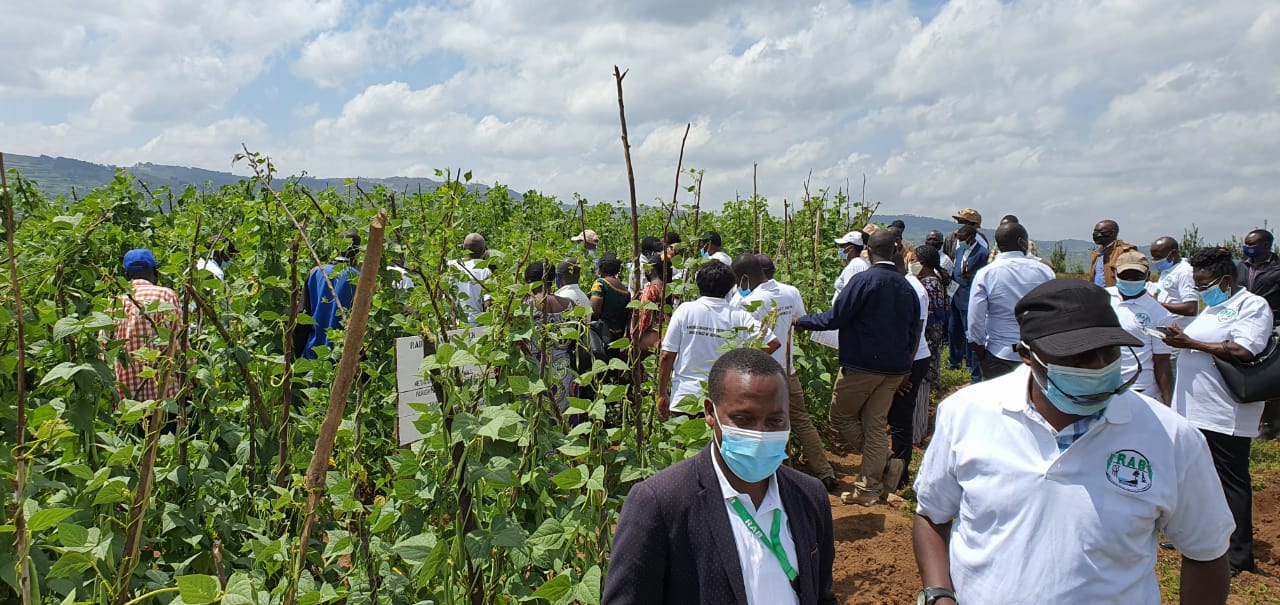Rwanda has one of the highest per capita consumption in the world, confirming that beans are a key crop for food security in the country. Common bean is an important food crop for Rwandese. It is often referred to as the meat of the poor.
On 24 June 2021, the Rwanda Agriculture and Animal Resources Development Board (RAB) together with the Alliance of Bioversity International and CIAT through the bean programme – Pan Africa Bean Research Alliance, Africa Union, Alliance for a Green Revolution in Africa, Harvest Plus, and other partners released 19 new bean varieties in Rwanda. 13 of these new varieties are climbing beans whose yield averages 5200kg per hectare compared to 3400kg/ha previously. There are eight high iron and Zinc beans with high yielding and market preferred traits.
In attendance were multi-stakeholder bean value chain actors including private seed producers, processors, and export traders who will be critical in the dissemination plan.
In his remarks, Dr. Charles Bucagu, Deputy Director-General in charge of agriculture research and technology transfer encouraged farmers to use the newly launched bean varieties to increase their productivity, as the bean is a key crop of significant economic and social importance in Rwanda. ‘‘The role of different stakeholders in the bean value chain towards the development of Agriculture is popular and the next step is to work with different actors in the bean value chain to increase access of these new bean varieties by the farmers.’’
Nzeyimana Alexis, a seed producer from Ngoma District (Karembo sector), ‘’The new bean varieties came at the right time since the market is available.’’ He urged his fellow farmers to grow the new bean varieties to increase their productivity as many farmers are still growing their local seeds or keep seeds for many years. He said,” We need to grow these new bean varieties targeting the market so that we can get money and improve our livelihoods.”
Farm Fresh Ltd representative, Nizeyimana Andre in the event thanked RAB for this great achievement and said that the new bean varieties are a good opportunity for them to diversify their products and increase their market. He said that they have been packaging only two types of beans: one mixed and one biofortified (RWR 2245) and now they have more choices.
The Alliance of Bioversity International and CIAT’s representative and Markets Researcher Dr. Eliud Birachi present at the event lauded the long-standing partnership between the Alliance’s programs contributing to the bean work of PABRA and Harvest Plus and the RAB. “We will continue to support the modernization of RAB’s breeding program and to enhance its capacity in demand-led breeding to better respond to market and user bean corridor demands.”
Beans provide 32 and 65 percent of calories and protein intake in the Rwandan household diets, whereas protein sourced from animals provides only 4 percent of the protein intake. Yet, despite the high consumption and the expanding market demands, yields have continued to be low due to high input costs, adequate access to improved bean seeds, and inadequate use of improved technologies that enhance productivity.
Bean cultivated area has been increasing with season 2021 A season increasing by 7 percent compared to 2020 A season. The area under bean cultivation for the 2019/2020 year registered an increase of 11 percent compared to other crops such as Maize (2%), sorghum (5 %) rice (-10 percent), Irish potatoes (-3%), and bananas (-2%). Bean production in the 2021A season increased by 14 percent compared to the previous 2020A season. The use of improved seeds by farmers was quite low with the use of improved bean seeds of bush and climbing beans stood at 7 percent and 0.3 percent, respectively.
The bean market in Rwanda is thriving opening business opportunities for various actors in the bean value chain in the country. This is attributed to the government support investing in infrastructure, availability of diverse potential varieties that are farmer preferred and the market demanded. The partnerships with aggregators such as SARURA are taking up huge volumes of beans for the local and export markets. Bean value addition is also creating a big demand for beans as a regular household meal. Farm Fresh Ltd in Rwanda is venturing into the precooked beans market that extends to most markets in East Africa. The beans take a short time to cook and great for the environment as they are already ready to eat. Farm Fresh distributes its beans to the local consumers in Rwanda including to schools as part of a school feeding initiative. The release of these 19 new varieties is indeed a great milestone for Rwanda Agriculture and Animal Resources Development Board and partners after a decade-long wait. These beans will go a long way in replacing the old varieties that were susceptible to pest and disease attacks and whose yields were not optimized.
Conventional breeding has been applied in the research process and this has made it possible to have superior varieties that are early maturing, climate-smart, higher in iron and zinc micronutrients. Indeed, these are superior beans!
Read more about the launch:
RAB Launches 19 New varieties of Beans
U Rwanda rwungutse imbuto 19 z’ibishyimbo zitezweho umusaruro no guhashya imirire mibi



